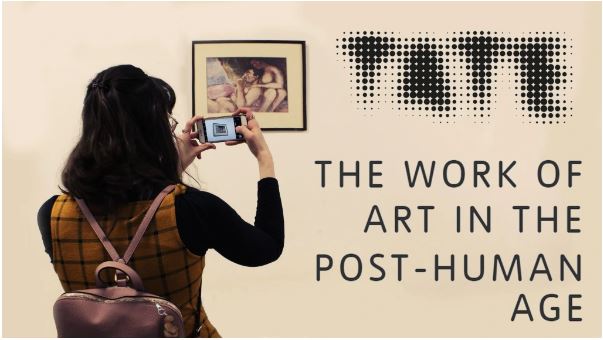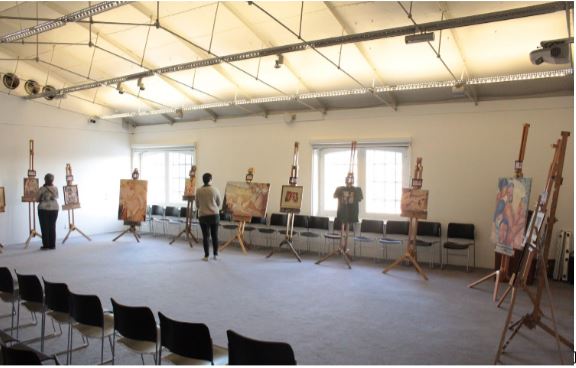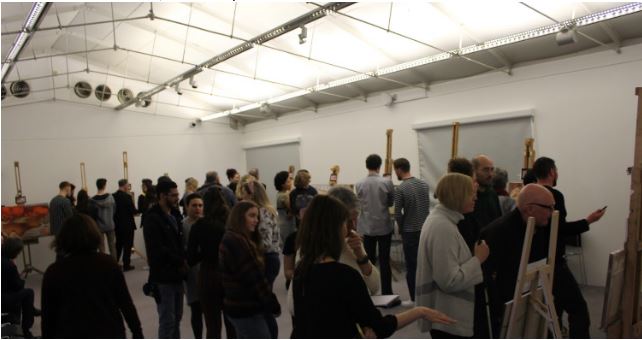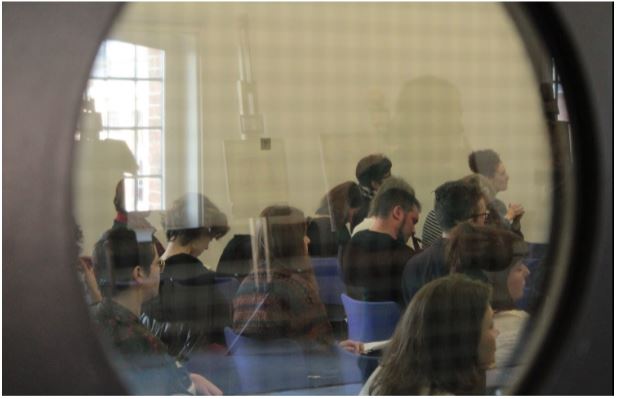
8th february 2020
A day long symposium with tate liverpool and liverpool hope university
What does it mean to be original? The main question that was floating around the room for most of the day at the TATE symposium. This day long symposium was a series of talks and short performances from artists and academics inspired by Walter Benjamin's essay called The Work of Art in the age of Mechanical Reproduction (1935), discussing the new ways of thinking about art in the Post-Human age. Among the discussions there was a selection of D.H Lawrence paintings (copies) exhibited in the performance space which had not been seen in this way since his exhibition in June 1929 where the original copies were confiscated for their explicit nature.

Lawrence paintings (copies) displayed for the first time in this way since 1929.
The day began with a light-hearted introduction by Dr. Niamh Malone, senior lecturer in Drama and Theatre Studies at Liverpool Hope University, discussing how she came across the copies of the D.H Lawrence paintings and the importance of having them all displayed in an exhibition once again.
The first speaker was Professor Malcolm Miles who discussed Walter Benjamin's work and how his ideas are still relevant in modern day thinking and society and how his ideas are forever being adapted through reproduction. He argued that "rather than inserting literature into the meaning of things it can be an agent in the reproduction of meaning, shifting the codes and categories by which the world is apprehended."
Dr Mike Finn then delivered Hope in Dystopia: Anarchism and Art in the age of surveillance capitalism, where he explored the shift of the political struggle to the "intersections between digital technologies and the self in the contest over the very 'means of production of knowledge."
A break was taken from the discussions for a short performance provided by four second year students from Liverpool Hope University entitled Labour. The performance critiqued the exploitative nature of the creation and reproduction of fast fashion. The four performers created a birthing scene in which the machine that created the clothes was a mother and the workers were the midwives and doctors. There was a fault with the machine and after she was fixed she started firing out images of exploited workers and handing them to the audience. A very thought provoking piece.
Francisco Romano then came to explain his work alongside Liverpool Hope University with the Institute Ramacrisna in Brazil. For 60 years the institute has run uninterrupted activities with schools across Brazil. Liverpool Hope University has worked with the organisation since 2004 to exchange knowledge with it's students and artisans through its program Global Hope. Brazil is currently the only non-English speaking country that takes part in this project.
A second performance break was taken for a piece titled Light 2 by Elizabeth Major and Craig Sinclair. Sinclair featured as a voice-over almost like a museum attendant, Major featured as a personified lamp. The lamp was wise and discussed their history and their knowledge with the audience. "The light knows that you are tired and that you have many questions..."
To conclude before the official break Dr Annalaura Alifuoco and Professor Simon Piasecki presented Feral Suit- OR How to explain holes to the Dead Archive. The Feral Suit is a two piece suit comprising of a jacket and a pair of trousers created in 1970 from coarse grey felt. It is now an exhibit in the TATE Liverpool but was found in a chest before it was hung on a wooden hanger as an exhibition. Professor Piasecki and Dr Alifuoco created a podcast for the group to enjoy, discussing the present condition and significance of the suit which you can now listen to through Castbox. During this session some guests decided to take their mobiles and listen to the podcast in the company of the Feral Suit. You may wish to do so too, please find the link below and if you're in and around Liverpool anytime soon maybe give it a visit.
https://castbox.fm/channel/The-Work-of-Art-in-the-Post-Human-Age%2C-symposium%2C- Tate-Liverpool
Link for Feral Suits- OR, How to explain holes to a Dead Archive.

Guests during a discussion about interested but non-judgemental opinions.
Following from the official break and an optional concert that took place during the lunch period, Professor Madelena Gonzalez joined the guests to discuss Making Art Count: the aesthetic (and its uses) in the digital age: some reflections on theatre and the novel "Illuminations" by Walter Benjamin. Through her talk she aimed to reconnect us with our bodily senses to help us in connecting our minds, bodies and technologies in order to enhance well being for the users of such technology. She questioned whether aesthetic is "a necessary
component of human experience in the world, not just as a possible surplus value within the circuits of production, but as a human basic need..." Something that is very relevant to today's society in this world of technology.
We were then joined by three more second year students from Liverpool Hope University presenting a short performance called Geld. The themes centred around the hyper inflation crisis in Germany in 1923. The performers had a large amount of paper money that they were using as everyday objects, for example food, cards, snow, a football etc. In terms of Walter Benjamin they were displaying what reproduction can do to an object overtime and how this affects people.
Following on Dr Kelly Hickey joined us to present The Phony Spell of Commodity: Creating functional spaces to promote the Arts as an instrument of magic. Using Dublin City Council's project Rathu as a source, Dr Hickey's paper studies the "malleability of neoliberal ideals to improve the public sector". The Rathu project is a social enterprise which tries to create spaces that are functional for arts practices to empower and enable people to be involved and create.
And finally we had Grace Harrison from Kitty's Launderette. Kitty's Launderette is a community launderette and social space situated in Everton. They offer high-quality yet affordable ecological and dry cleaning services as well as a safe and comfortable space for people to learn, chat and socialise. Grace came to discuss their work within the community and the effect of their services.

We rounded up the day with a thank you from Gary Anderson and a particular thank you to
Niamh Malone for organising the day. A wonderful day of academia and art.
Former Symposia:
- In Athens’ Shadow: Radical Cultural Responses to Crisis in Urban Democracy, Feb 2017. Convened by Dr Niamh Malone. The proceedings of which have been published in the international online peer reviewed journal Kritika Kultura (vol 30.31) co-edited by Dr Niamh Malone. (https://www.tate.org.uk/whats-on/tate- liverpool/exhibition/liverpool-biennial-2016/athens-shadow)
- Art Disarming Philosophy: Non-Philosophy and Aesthetics, Feb 2018. Co-convened by Dr Niamh Malone, Dr Gary Anderson and Dr Steven Shakespeare. The proceedings are currently being edited for a forthcoming book Dec 2020. (https://www.tate.org.uk/whats-on/tate-liverpool/workshop/art-disarming-philosophy)
- Alien Sound: Ambient Music and the Limits of the Human. Feb 9th 2019. Co- convened by Dr Niamh Malone, Dr Gary Anderson and Dr Steven Shakespeare. (https://www.tate.org.uk/whats-on/tate-liverpool/workshop/alien-sound)